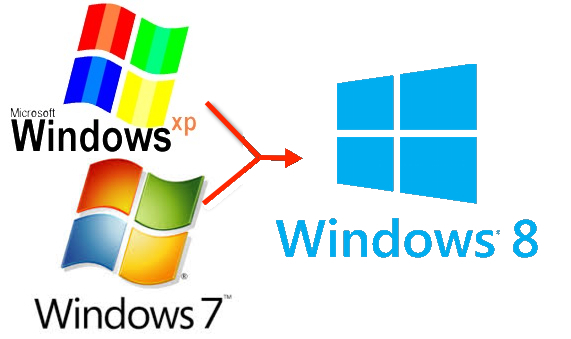Mobile vs desktop: Microsoft's least significant challenge with Windows


Whatever you feel about Windows 8, it's pretty good for both mobile devices and desktop PCs. A lot has been written about putting the mobile face (aka Metro/Modern) first over the Windows 7 style desktop in Windows 8.
Which face you prefer is largely dependent on what type of device you use with Windows 8. Microsoft has to deal with both camps and while that's hard to do it's not the biggest challenge the company faces with Windows.
Windows 8 adoption hasn't been setting Microsoft's world on fire. The percentage of Windows installations running Windows 8 is much smaller than that of Windows 7, and even those still running Windows XP. The following figures by Netmarketshare for January 2014 are based on web traffic so they are not official figures by any means, but they are useful for estimating the proportion of Windows installations running each version.
The huge number of Windows XP installations is particularly important as Microsoft prepares to end support for the 12 year old version of Windows. These are largely corporations who have felt no need to upgrade to either Windows 7 or Windows 8, but with security updates soon to end that needs to change.
ZDNet has outstanding resources to help deal with the Windows XP end of life.
The biggest competition for Windows 8 is not the iPad nor Android tablets, it's Microsoft's older versions of Windows.
Microsoft needs to get as many of these installations onto Windows 8 as possible, and that's probably a primary driver behind the expected focus on the desktop in the next updates for Windows 8. That's a good thing for Microsoft to focus on, as this is a huge customer base that needs to move forward to the latest version of Windows.
See related: Windows XP and the Future of the Desktop
As big as the Windows XP installed base is, the Windows 7 segment is even larger. Microsoft wants to get this huge group moving forward to Windows 8, too.
How to get these two massive segments onto Windows 8 is no doubt a major focus in Redmond. It not only impacts Microsoft's business but that of its partners, too.
All the major OEMs using Windows are madly producing hybrids and touch laptops running Windows 8, in an attempt to stem dropping PC sales. That's not a bad strategy, but for it to succeed a lot of the companies still running Windows XP and Windows 7 need to upgrade their infrastructure to Windows 8. If that happens it's a win-win for the OEMs and Microsoft.
Windows XP: The end
That's the major test facing Microsoft with Windows. The mobile vs desktop confusion with Windows 8 does play a role in the hurdle Microsoft faces with Windows down the road, but it's relatively minor compared to getting existing customers to upgrade to Windows 8. It's hard to get new customers (mobile) when your existing ones don't buy your current products.
The redesign of Windows 8 to tackle the tablet market segment was probably an attempt to compete with Android and iOS. That's a legitimate effort, but oddly Microsoft's biggest competition for Windows 8 is its own earlier versions of its OS.
This big challenge Microsoft faces getting customers to upgrade to Windows 8 is a result of it's huge success in the past. Millions of customers are still happy using older versions of Windows because they are so darn good. Windows 8 is better but from their viewpoint only marginally so. The mobile vs desktop confusion in Windows 8 doesn't do much to help convince them to upgrade.